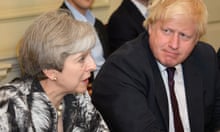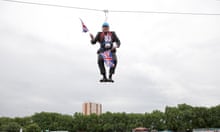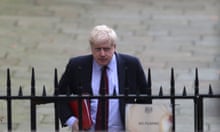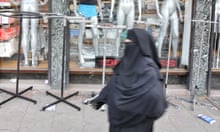‘Oh, there goes a letterbox.’ On Saturday, while Sidrah Sajad was out shopping in Manchester, where she lives, she heard a man – middle-aged, white – say this to a companion as she walked past. “I turned around and said: ‘Excuse me,’ and they just walked off,” she says. She was in a rush that day, but usually – because abuse happens fairly regularly – she likes to confront it. “I’m the sort of person who will engage. If someone is saying such negative comments, I like to approach them and give them the opportunity to talk to me, say: ‘Why would you say something like that?’” How did she feel? She sighs. “You know what, it’s ignorance. That person is not educated. Part of British values is trying to respect and embrace the norms of all the faiths. Even if we don’t understand it, we honour common ground. Every individual has a choice to live their life the way they want to, and we should respect that.”
It is just over a week since the former foreign secretary Boris Johnson likened women who wear the niqab – the face veil – to “letterboxes” and “bank robbers” in a column for the Daily Telegraph. Johnson said he was against a ban but his comments, whether throwaway or carefully calculated – including that the burqa and niqab were “odd” and “oppressive” – have had real-life consequences for many British Muslims. Women have spoken of feeling vulnerable, and some have been abused. The anti-Muslim hate-crime monitoring group Tell Mama has reported a spike in abuse against Muslim women since Johnson’s column appeared. In the week before the column was published, five women reported incidents against them (all were wearing the hijab, and none wore the niqab). In the week after the column, 14 women wearing the hijab and seven who wore the niqab reported abuse to the organisation.
These figures are likely to be much lower than the real number. A Tell Mama spokesperson says: “Bear in mind that niqab-wearing women rarely report anti-Muslim hate. In work we have done with them, they have mentioned that they receive abuse on such a frequent level, they do not bother to report it. So the rise is measurable and important.”
“Comments and political statements have impacts,” says Iman Atta, the director of Tell Mama. “Boris Johnson is a privileged white male who has had a route to power and influence that many from black and ethnic minority groups could not even dream of. In this privileged position, he calls Muslim women who wear the niqab ‘letterboxes’ and ‘bank robbers’. These are some of the most marginalised women, who cannot find employment and, in some instances, have few choices. But to Johnson, his political ambitions mean that he is willing to call them terms that are dehumanising. It is this dehumanisation that leads perpetrators to feel emboldened enough to target these women for anti-Muslim hate.”
“People are now mocking Muslim women and attacking them because of the remarks he has made,” says Sajad, who works as an education mentor. “To not apologise, he must have an agenda behind it.” Has it made her nervous to go out? “It is quite dangerous to go out there, not knowing what will come in front of you. Muslims in general are being attacked; there are a lot of hate crimes. You have to be cautious.” She wouldn’t go out at night, she says. “Of course it has made me worried, it does play on my mind. If I can change anyone’s perception, or misconception of how we are, then I’ll try my best. When I go shopping, I’m friendly at the till, I always say hi, have a conversation.”
At the weekend, Kulthum Haque’s daughter was out with a friend, both wearing niqabs, and a man made a “letterbox” remark. “A lot of times, I asked them not to say anything [back] because there have been times in the past where they have been abused further,” says Haque. “That’s my fear, that they will get hurt. The majority of the time they tend to ignore it, but it does get to you.” Haque, who also wears the niqab, volunteers in a local school in Bolton; one of her daughters is a primary school teacher and the other a nurse. “It’s really sad that we’re trying to work within the community and this is the sort of stuff [Johnson is] coming out with. We’re not uneducated, we’re all working. Because of the comments, it’s made it unsafe for us and we’re cautioned by our family before we leave the house to be on our guard. It’s made it unsafe for us on our own streets.” Though, she adds, “it was unsafe anyway”.
Before, she has heard offensive remarks aimed at her while out shopping. “We do get it off the older people, and sometimes it’s the younger boys. A lot of time I put it down to ignorance and ignore it. They’ll say: ‘Can we post something in?’ We have it anyway occasionally, but it’s increased now. It’s become a joke for everybody, to say what they want to say. Even in the car, you still get comments or gestures. If I have to walk, then I try to have someone with me. It shouldn’t have come to this. Politicians are supposed to be there to protect a community.”

Very few Muslim women in Britain wear the niqab. It isn’t known how many, but it has been put at up to 5,000 women, although even this is likely to be an overestimate. The idea that Britain’s culture is at risk from the dress choices of, at most, a few thousand women is laughable, but it does make a minority within a minority more vulnerable. Even fewer women wear the burqa, the full-length veil that covers the entire face and body. But even women who wear the more common hijab headcovering have reported feeling victimised in the past week. One woman was walking with her husband and three-month-old baby in south London three days after Johnson’s column, “when an English middle-aged woman and her mother undertook us”, she says. “As they walked past, the younger woman said: ‘I don’t know why they have to wear that on their head.’ Which the older woman agreed with and mumbled something about ‘this country’. I said to them: ‘Excuse me? I sincerely hope you’re not talking about me. I was born and brought up in this country.’ The older woman turned round with her hands up and said: ‘Sorry, sorry.’ But the younger woman didn’t turn at all and kept walking, pretending she hadn’t heard me.”
Even if a woman hasn’t experienced direct abuse, the psychological impact this week has been real, says Mariam Khan, the editor of It’s Not About the Burqa, an anthology of essays by Muslim women to be released next year. She wears a hijab and acknowledges “double-checking behind me after I get off the bus, not wearing headphones, being aware of Muslim women around in my area who wear the burqa and worrying they will be hurt. Worrying about family members who wear the burqa and wanting to know what to do to keep them safe. This isn’t anything new, though. Johnson’s comments were intentional and malicious and they have put Muslim women, especially visible Muslim women, in even more danger than they were previously. So much Islamophobic hatred goes unreported and I dread to think what Muslim women have had to go through, what they haven’t reported, what they don’t know if they can report.”
Sophie, a freelance translator who lives in London, says she has mainly been “lying low” in the past week. “I haven’t had anyone actually saying ‘letterbox’ to me but I’ve been actively avoiding putting myself in that situation,” she says. “I’ve avoided public transport, I haven’t been out by myself.” She has been having panic attacks since late last week. “I’ve had stupid amounts of hate in my Twitter mentions. It’s just [feeling] under the spotlight, along with every other Muslim woman in this country: why are you the way you are? Why do you wear what you wear? Being asked to justify my existence.”
She converted to Islam 11 years ago and has worn the niqab for about five years. Every time the veil is criticised by someone in the media, “the hostility is palpable. You get people staring at you, jostling you, ramming you with their trolley, barging past you. It just gets really draining and is quite unpleasant. Previously I have been sworn at: ‘Terrorist fucker,’ that kind of thing, ‘Go back to your own country,’ which is hilarious because this is my country. I’ve had people say: ‘Why do you wear that thing? Take it off, you’re in England now.’ I just find it so bizarre that an item of clothing can attract so much hostility and abuse. Most of the time I go out, I’m with one or two of my three children. My oldest child is 10 and it’s horrible that she’s witnessed so much abuse at this age.”
If there has been a positive slant this week, says the writer and scholar Fatima Barkatulla, who is from London, it is “seeing the numbers of British people who have really stood up for Muslim women. I have felt really proud of that element of our society. [Johnson’s comments] haven’t gone unnoticed – we haven’t become so desensitised to Islamophobia that when things like this happen, it is just considered normal. In some European countries, nobody would bat an eyelid at comments like these. It shows you that in Britain there is a core of goodness that wants communities to be united.” But it is “obviously troubling”, she says, that “certain elements of society who are feeling disenfranchised or are basically racist have been given a bit of a boost”.
Has Barkatulla, who often wears the niqab, felt more vulnerable this week? “It depends on where I would go. My area is very multicultural so I haven’t felt it here, but if I were to go to certain areas then definitely. I’ve been vigilant, but I feel like most people around me in my community have seen what he’s done as a negative thing.”
“Boris Johnson timed it really well,” says Sahar Al-Faifi, a geneticist and community activist, who lives in Cardiff. “He wanted the debate around during silly season, when most of the MPs are away and journalists are looking for news. He timed it well to get the populist vote at the expense of veiled women’s safety. It will have an impact on our daily life because he has now normalised even further alienation and racism against Muslim women.” In the past week, says Al-Faifi, who wears the niqab, “my social media feed has been horrendous. I reached a point where I had to put my phone on flight mode. I’ve been told: ‘Go back to your country if you’re not happy to adhere to our laws.’ Very abusive language. There is a lot of ‘othering’, that I’m somehow alien and will never be accepted in society unless there is nothing recognisable in me as a Muslim.”
She says beyond the social media abuse, she hasn’t experienced any recent incidents in the street – although it happens every couple of weeks or so. “I don’t go to work the same route every day. There are little things that many people might not consider – when I wait for the underground in London, I stand next to the wall, not by the yellow line [at the edge of the platform] because I’m worried that someone might push me. I have to inform my family all the time where I’m going and what time I’ll be back because they get worried for my safety.” Her parents have pressured her not to wear the niqab. “I keep insisting: ‘No, this is who I am, this is how I want to express my faith.’ But it has a ripple effect on the rest of the family. My sister doesn’t wear the veil but she is worried that these comments have led to more hate crime against us.”
Does she think the niqab row will blow over, or is it here to stay? Islamophobia, she says, “has become part of my life. It’s about living it as it is, but at the same time I don’t want these negative sentiments to have an impact on my life. It’s a real struggle because I want to go about my daily tasks and be active within society without fear, and I’ll carry on doing this. I am a victim but I don’t have a victim mentality. I’m here to challenge, to see Britain become more inclusive and more welcoming.”









